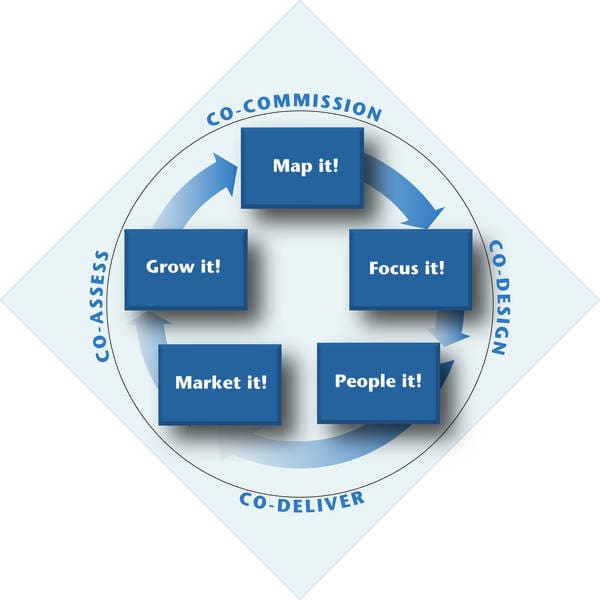A few weeks ago, FSG participated in the Kommunalkongress 2013. This is a bi-annual local government conference organized by the Bertelsmann Stiftung, one of Germany’s largest private foundations. The theme of the conference was “tackling the future together.” As you can imagine, elements of the collective impact approach were in the air in every keynote speech and panel discussion. Participants from across Germany, from both civil society and local governments, agreed that complex problems could only be solved if multiple actors worked in concert. Several of the break-out workshops focused on the topic of “civic participation processes,” which we see as seedlings of collective impact.
Civic participation processes describe the involvement of the community in co-commissioning, co-designing, co-delivering and co-assessing local government products and services. Governance International has developed a framework capturing this concept:
A comparative study conducted by Governance International and TNS Sofres in five European Countries showed that Germany already has a high degree of such participation processes. For example:
-
Crowd-sourcing for community improvement ideas
-
Issue specific dialogues with citizens aimed at identifying priority areas for action
-
Handing over government responsibilities to citizens, e.g. budget allocation
These civic participation processes have great potential in spurring collective impact:
-
Empowering Champions: When you consult citizens through an open, crowd-sourced process for ideas for how to improve the community, a large number of different issues will surface. The role of local governments is to identify how these different issues relate to specific social problems (e.g. youth unemployment, substance abuse or demographic change) and bring the community’s support of these issues to the attention of the wider public. Knowing that citizens stand behind addressing these issues will provide more legitimacy and motivation for actors in civil society and/or local government to become champions for these specific issues or social problems.
-
Building Awareness and a Sense of Urgency: We’ve seen examples in Germany of local governments engaging citizens in a dialogue on a specific issue. The goal is both to collect a large number of different perspectives on a specific problem and to prioritize approaches for addressing the problem. The result is wider public awareness of the problem and its underlying issues, which can drive urgency for change in a community. Moreover, armed with a list of prioritized areas for action, local governments can more easily organize targeted research (data collection) and analysis as well as round tables with the relevant actors from different sectors. These can ultimately lead to the development of a common agenda.
-
Forging Cross-Sector Relationships: Ideally, these civic participation processes bring members of different sectors to the same table. Brainstorming together on the nature of the problem can help both define a shared objective and shape different interventions for meeting that objective. It also initiates trust and coalition building. These initial interactions can thus lay the groundwork for a collective impact initiative.
The role of local governments in these civic participation processes is crucial. They need to both decide on the appropriate format for the participation processes and provide the necessary background information to citizens in order to guarantee a data-driven and purposeful discussion. This means sharing existing knowledge and data on specific issues with the citizens involved and investing into research on issues where knowledge and data is not yet available. It is a key step towards understanding and approaching issues and problems holistically. Local governments have to finely balance steering the participation processes whilst making sure not to influence their outcomes as it would jeopardize the legitimacy of the results and undermine the purpose of civic participation.
If you wish to learn more about collective impact in Germany, please view our new study “Gemeinsam wirken – Systematische Lösungen für komplexe Probleme”

